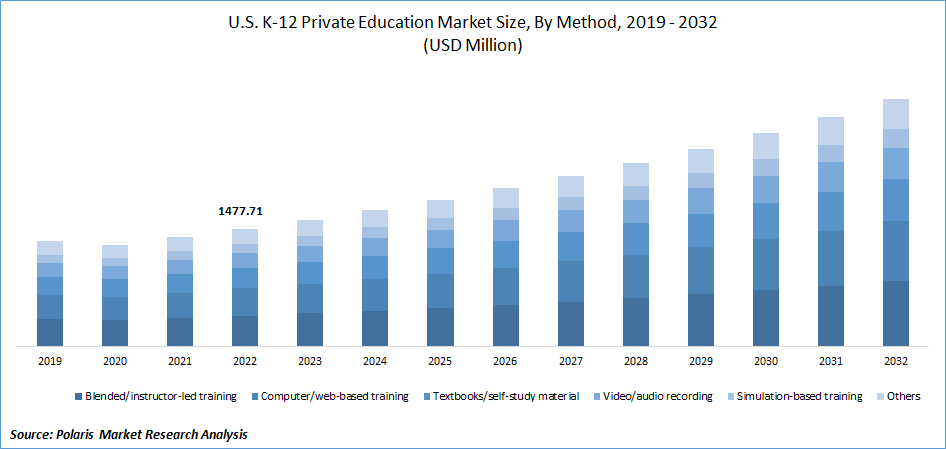
K-12 Private Education Market Share, Size, Trends, Industry Analysis Report
By Method; By Service Providers; By Application; By Region; Segment Forecast, 2023 - 2032
- Published Date:May-2023
- Pages: 119
- Format: PDF
- Report ID: PM2281
- Base Year: 2022
- Historical Data: 2019-2021
Report Outlook
The global K-12 private education market was valued at USD 7,602.89 million in 2022 and is expected to grow at a CAGR of 7.6% during the forecast period. Technological advancements in the teaching sector, installing robots by public-private players, increasing government funding for the teaching sector, and increasing awareness among people for primary teaching are driving the K-12 private education market growth during the forecast period. Learning analytics and technological advancements, and big data have risen in popularity in the learning sector. The usage of LA encourages informative institutions to create a personalized learning experience. Several measures have been implemented in recent years to improve teaching quality, such as establishing quality assurance authorities, developing guidelines, and fostering technology-driven schooling, among others, resulting in overall learning quality increases.

Know more about this report: Request for sample pages
Moreover, the rising government funding and task force launch for improving schooling are propelling the K-12 private teaching market growth. For instance, in September 2020, Governor Jared Polis established the USD 32.7 million Response, Innovation, and Student Equity Education (RISE) fund to assist high-needs school district lines, independent schools, and government institutions of higher learning in developing sustainable, innovative ways to improve student learning, close investment gaps, and improve productivity for students in grades pre-K through private higher schooling.
Additionally, Tony Thurmond, the state's superintendent of public instruction, publicly established a task force in November 2021 to foster and advance young readers. Prominent leaders from the nonprofit, higher education, government, and pre-K–12 private school sectors are represented on the task team. The task force will meet once per month, and its members will divide into working groups to focus on particular suggestions for assisting California's children in developing their reading abilities.
The COVID-19 pandemic has affected various industries, including education, resulting in school closures and the adoption of online learning. K-12 schools quickly transitioned to e-learning, and EdTech startups have partnered with them to provide a transformative experience. The use of online learning systems has increased, aided by government support and the adoption of digital technologies. EdTech has shifted towards digitalization and online assessment processes. Many K-12 schools have reopened for in-person classes as the third COVID-19 wave dissipates. The pandemic's long-term effects include increased demand for e-learning, the need for skilled labor, and government efforts to increase worker levels, all of which will drive market expansion.

Know more about this report: Request for sample pages
Industry Dynamics
Growth Drivers
The software solution offers businesses well-organized enterprise resource planning solutions that aid academic staff in improving courses and efficiently managing classrooms and schools. A wide audience can be managed by teachers without any financial restrictions due to the virtual classrooms created by online education platforms. Online courses give learners more one-on-one time with their professors. Additionally, the majority of K–12 online courses are cheap or even free.
Mobile devices are becoming more popular for smart learning due to their portability and make it easy to obtain knowledge and engage in social activities. Additionally, teachers and students can get feedback with just a few clicks while communicating effectively and efficiently. The most recent ICT technologies allow intelligent measurement and observation of learning outcomes for both ability and knowledge.
Institutions utilize software like Blackboard to organize their courses and give students access to modular materials and information. Today, there are many technologies, like Skype, that can help simulate the interactions between an instructor and student in a classroom. Social media has changed this and allows students to participate in real-time, despite some claims that online learning lacks the social aspect or physical connection in a classroom.
Students may access knowledge from wherever they are due to online learning, which also makes sure that resources are constantly available. Students can access books online, for instance, rather than going to the library. The number of online enrollments is increasing that drives the K-12 private education market. For instance, according to World Economic Forum, during pandemic the online enrollment hit a three-fold increase bringing the figure from 143 million in 2020 to 189 million in 2021.
Report Segmentation
The market is primarily segmented based on method, service providers, application, and region.
|
By Method |
By Service Providers |
By Application |
By Region |
|
|
|
|
Know more about this report: Request for sample pages
The Computer/Web-Based Training segment is projected to grow at the fastest rate over the projected period
The Computer/Web-Based Training segment is projected to grow at the fastest rate over the projected period. Computer/ Web-based training is the pedagogical method of delivering academic and skill-based learning modules in a virtual mode. K-12 Private Academy's online program combines structure and adaptability that keeps the student engaged while enabling flexibility in their learning speed.
High degrees of contact between the teacher and the pupils are made possible through computer-based technologies. Computer based training is crucial in enhancing current educational paradigms and empowering students to face the future. Computational thinking can also be incorporated into computer education through problem-solving techniques including of decomposition, algorithm utilization, abstraction, and automation.
EdTech Companies segment held the largest market share in 2022
The EdTech Companies segment held the largest market share in 2022. Edtech companies provide, create, and utilize the resources in the classroom to develop a more engaging and customized learning environment. These companies offer solutions that include interactive displays, virtual classrooms, and massive open online courses. Edtech companies seek to improve student results, enhance learners' capacities, and lighten teachers' workloads.
EdTech platforms help students overcome difficulties on their path to a complete education. Students are shifting towards eBooks available online to them anywhere in the world. Printed content costs more than digital content, which can be produced relatively cheaply. eBooks are available in various languages so they can be easily translated as a user choice. Furthermore, students with physical disabilities can listen to the educational material in an audio file format to expand their vocabulary and promote better explanative reading. For instance, In Jan 2022, Texthelp Ltd. launched OrbitNote, a new EdTech tool pdf-enabled app that would be helpful for visually challenged students to access documents by text-to-speech feature.
The Primary School segment is projected to grow at the fastest rate over the projected period
The Primary School segment is projected to grow at the fastest rate over the projected period. Primary school refers to learning provided from grade one to grade five. The primary school offers a supportive and demanding atmosphere that is student-centered. Instead of learning from what is taught, students learn more from how it is taught to them.
According to educational philosophy, learning is most effective when it is: comprehensive, inquiry-based, genuine, interconnected, collaborative, demanding, democratic, interpersonal, iterative, safe, and lifelong. These learning concepts are intended to provide a stable atmosphere where students may develop their abilities and skills.
The amount and quality of education that individuals acquire now is more important than ever for the development of the country. Primary school a fundamental necessity. All countries in the world have made primary school their top priority since it serves as a strong foundation for higher education. The success of democracy, the growth of the economy, and the standard of living of countries are all strongly correlated with primary education.
North America is projected to witness a significant growth rate in the forecast period
The North American K-12 private education market is projected to witness a significant growth rate in the forecast period owing to major factors such as rising enrollments in K-12 private educational institutes and increasing penetration of EdTech companies in the recent years. The education system for private K-12 market in North America is generally segmented into pre-primary (Age 3-5), Primary (Age 6-11) and Secondary (Age12 – 17) grades and is compulsory from the age 6 to 17 years. As per UNESCO institute of statistics, the population for students in United States stands at 12.07 million for pre-primary grade, 24.39 million for primary grade and 25.05 million for secondary grades in 2020.
The rising enrollments in kindergarten, primary and secondary private schools In United States is one of the primary factors for growth of the private K-12 market in North American region. For instance, National Center for Elementary Statistics at Institute of Educational Sciences, United States constitutes of more than 30,000 private elementary and secondary schools with enrolled 4.65 million students in 2019 – 2020. Of the total enrollments in 2019 – 2020, kindergarten schools were witnessed more enrollments over primary and secondary grade schools in U.S. The major factors for the shifting of trend in enrollments towards private kindergarten, elementary and secondary private schools owing to better learning outcomes from private schools over public ones.
Competitive Insight
Some of the major players operating in the global K-12 private education market include Newsela Inc., Pearson, McGraw-Hill, Nadeen International School, Cengage Learning Inc, Chegg Inc., Dubai International Academy, TRINITY SCHOOL, Byju’s, NextEducation India Pvt Ltd., The Roxbury Latin School, Adobe Systems, Blackboard Inc., GEMS Education, Holistic Minds Private Limited, and Stride Inc.
Recent Developments
- In January 2023, Cengage group collaborated with Gale Digital Scholar Lab to support project-based learning with this platform's additional capability, academics, teachers, and students from the same university may work together on digital humanities projects.
- In January 2023, McGraw Hill announced that two institutions in Egypt, Rajac International School and OWN Heliopolis School, expand their use of McGraw Hill’s state-of-the-art digital content for students in grades kindergarten through 12.
K-12 Private Education Market Report Scope
|
Report Attributes |
Details |
|
Market size value in 2023 |
USD 8,176.15 million |
|
Revenue forecast in 2032 |
USD 15,780.8 million |
|
CAGR |
7.6% from 2023 – 2032 |
|
Base year |
2022 |
|
Historical data |
2019 – 2021 |
|
Forecast period |
2023 – 2032 |
|
Quantitative units |
Revenue in USD million and CAGR from 2023 to 2032 |
|
Segments Covered |
By Method, By Service Providers, By Application, By Region |
|
Regional scope |
North America, Europe, Asia Pacific, Latin America; Middle East & Africa |
|
Key Companies |
Newsela Inc., Pearson, McGraw-Hill, Nadeen International School, Cengage Learning Inc, Chegg Inc., Dubai International Academy, TRINITY SCHOOL, Byju’s, NextEducation India Pvt Ltd., The Roxbury Latin School, Adobe Systems, Blackboard Inc., GEMS Education, Holistic Minds Private Limited, and Stride Inc. |
FAQ's
The K12 private education market report covering key segments are method, service providers, application, and region.
K-12 Private Education Market Size Worth $15,780.8 Million By 2032.
The global K12 private education market expected to grow at a CAGR of 7.6% during the forecast period.
North America is leading the global market.
Key driving factors in K12 private education market are the popularity of learning analytics in the educational sector.
